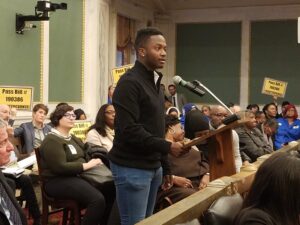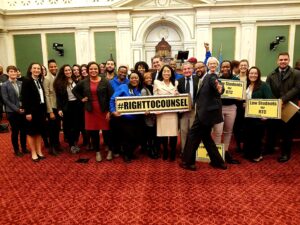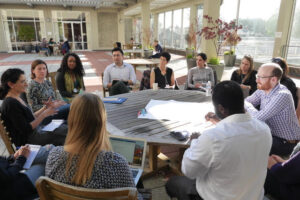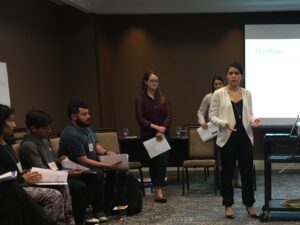The Berks County Detention Center–—which first held immigrant families and then women—is finally shutting down. The federal government announced that it is ending its contract with Berks County on January 31, 2023.
The Shut Down Berks Coalition, comprised of organizers, lawyers, immigrant leaders, faith communities and allies, has long been advocating for the closure of the facility due to the inhumane treatment of immigrants, many of whom are fleeing violence and seeking protection. While the facility first opened in 2001, it was under the Obama Administration that a record number of immigrant families were detained at the center, including mothers and infants. Most recently, Berks County converted the facility into one that held adult immigrant women.
The Social Justice Lawyering Clinic (SJLC) has long been working in support of the coalition to call for closure of the facility. Rhiannon DiClemente (‘16) and Paige Joki (‘17) first outlined the case for why the facility was illegally holding families and children under Pennsylvania law. In 2016, the Pennsylvania Department of Human Services (PA DHS) revoked the operating license for the facility. John Farrell (‘17), Anthony Sierzega (‘18), and Mariya Tsalkovich (’18) then drafted an Urgent Action Appeal on behalf of over 50 immigrant right organizations with the U.N. Working Group on Arbitrary Detention arguing that the facility is engaged in unfair and arbitrary practices that restrict liberty and endanger the health and dignity of families.
In opposition to Berks County’s continued litigation to challenge the revocation of their license, SJLC filed an amicus brief on behalf of physicians, psychologists, social workers, nurses, and Psychologists for Social Responsibility about how detention inflicts serious harm on asylum-seeking children. In December 2019, Emma Pajer (’20) and Jediah Grobstein (’20) helped to file a lawsuit on behalf of several families based on PA DHS’ unlawful back door agreement to continue operation of the facility without a license. In March 2021, when Berks County decided to convert the facility into a women’s detention center, Lina Ruth Duiker (’22) and Kate Steiker-Ginzberg (’22) helped Berks County residents file a Sunshine Act lawsuit against the county for being secretive about its proposal for conversion and expansion of bed space at the facility.
All this work by SJLC was done in collaboration with community and legal partners: Aldea, Al Otro Lado, Free Migration Project, Juntos, Make the Road Pennsylvania, Pennsylvania Immigration and Citizenship Coalition, Syrena Law, and Villanova’s Farmworker Clinic.
At the end of the day, what triumphed was the powerful voices of the parents and children who had been detained at this facility. In a letter to the outside world, the Madres de Berks questioned how the U.S. government could continue:
“… depriving them of having a normal life, knowing that we have prior traumas from our countries, risking our own lives and that of our children on the way until we arrived here, having family and friends who would be responsible for us and who are waiting for us with open arms and that immigration refuses to let us out.”
As we continue to grapple with immigrant detention in Pennsylvania, may we remember these voices.

 Xavier and colleagues Julia Sheppard and Sarah Kim have spent the semester researching why so many landlord/tenant cases in Philadelphia result in default judgments — which then lead quickly to eviction.
Xavier and colleagues Julia Sheppard and Sarah Kim have spent the semester researching why so many landlord/tenant cases in Philadelphia result in default judgments — which then lead quickly to eviction.

 Social Justice Lawyering Clinic Students Tessa Carson (’17), Emily Diaz (’18), and Ashley Rotchford (’18) created the
Social Justice Lawyering Clinic Students Tessa Carson (’17), Emily Diaz (’18), and Ashley Rotchford (’18) created the